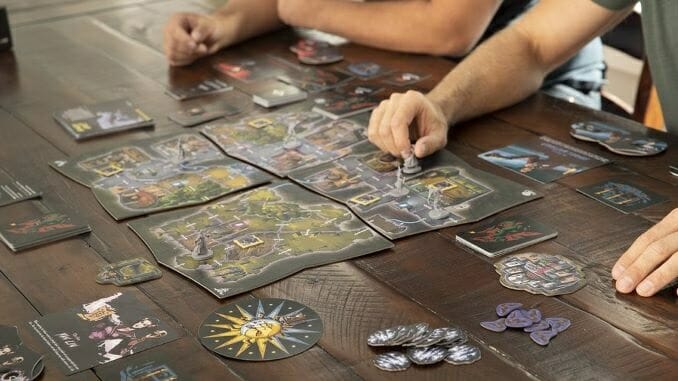Horror Board Game Deranged Is Just a Little Too Familiar
Photo courtesy of Ultra Pro Games Reviews board games
Deranged is a semi-cooperative game, a very narrow niche type of game where everyone works together… until they don’t, which is almost inevitable in this particular horror-themed title. First released in Russia by Hobby World back in 2019, it came to the U.S. this year via Ultra Pro, and has been available here for a few months.
If you’ve played Arkham Horror, you’ll recognize a lot of Deranged immediately. The players are working together to fulfill a scenario goal, which mostly involves clearing one or more monster types from the board, while visiting specific buildings to rid themselves of curses or search for additional items or clues. Rounds are tracked on a time wheel, and when night time ends, all players draw cards that might apply new curses to them or turn them deranged, which makes them into demons whenever the time wheel hits the night period, during which they will attack other human players to try to end their deranged status so they can still win the game.
Players have two different meters to track on their personal boards, one for health and one for sanity, which is a very Cthulu mechanic. One of the main differences between Deranged and some similar games is its reliance on a standard deckbuilding mechanic, where the hand of four cards you hold determines your actions for that turn as well as your ability to defend yourself between turns. Cards offer specific values for movement, attacking, defense, and searching. On your turn, you’ll play one card and choose one of those actions for free. You may use a second action, but in so doing, you lose one point of sanity. The ultimate goal is to remove all of your curses, retain or restore your human status (not deranged), and get to the exit from the board by the end of the last night of play. You all lose if at any point in the game all characters are deranged.
A few bad things can happen to you in Deranged, notably when your character is turned to that status, probably by one of the night cards. You then play as a human in the daytime, but as deranged in the night, turning your cards upside down and using the abilities printed on the bottom to hunt your fellow humans – or just close to one so they can use an item to exorcise your demons. You can also lose all your health points, at which point you are dead but not necessarily out of it, as you’ll return to the game one turn later in a different location. And you can lose all your sanity points, at which point you gain a curse card, are limited to one action in the daytime, and can’t take any actions at night (which would ordinarily cost you one sanity point).
The game has a basic scenario to help you learn the rules, and then multiple scenarios that use the full rules, including individual Role cards for players with secret objectives, multiple monsters on the board at the same time, and scenario effect cards to add additional challenges and bonuses to game play. The setup is a real bear, however, and both the text and graphics in the rulebook are not very helpful for setup, in large part because they rely too heavily on the game’s vernacular, assuming you already know which tokens and cards are which. The starting decks and item cards all have identical backs, even though you’re supposed to separate them into something like nine different piles when you first crack the game open, and again after each game play.
At the end of the day (or night), Deranged just felt overly familiar to me. We’ve seen this sort of game before, done better, most notably in the Arkham Horror game, which got a fantastic third edition a few years ago, as well as the Horrified games, which just got a new sequel with Horrified: American Monsters. Deranged might suit you if you love those games and want more of the same, but I don’t think it adds enough new ideas or mechanics to this genre.
Keith Law is the author of The Inside Game and Smart Baseball and a senior baseball writer for The Athletic. You can find his personal blog the dish, covering games, literature, and more, at meadowparty.com/blog.